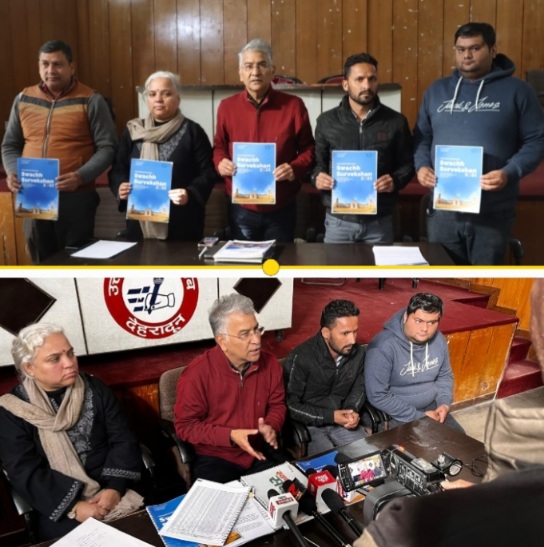Uttarakhand Cleanliness Crisis: 87 Out of 88 Urban Bodies Score Zero in Garbage-Free City Challenge, SDC Foundation Calls for Urgent Reforms
Dehradun – A damning report released by the SDC Foundation has painted a grim picture of Uttarakhand's performance in the Swachh Survekshan 2023 cleanliness survey.
The report, unveiled at the Press Club in Dehradun, reveals that 87 of the state’s 88 Urban Local Bodies (ULBs) scored zero in the Garbage-Free City Challenge, underlining widespread neglect in waste management.
Adding to the concern, 80% of Uttarakhand's ULBs with populations below 1 lakh ranked in the dirtiest quarter of North India’s urban cleanliness assessment. The findings highlight a significant need for systemic reforms to address the mounting waste crisis.
Key Recommendations: Waste Management Commission Proposed
The SDC Foundation has made 10 key recommendations to tackle the crisis, the most significant being the formation of a dedicated Waste Management Commission. This body would oversee the management of all six waste categories, including solid, plastic, e-waste, biomedical, construction, and hazardous waste, cutting across urban, rural, and forested areas.
The Foundation also called for a special legislative session to educate state leaders on environmental and cleanliness issues, emphasizing the need for a Jan Pratinidhi Andolan to address the apathy of political and bureaucratic classes.
ULBs in Crisis: Poor Rankings Across Categories
The report delves into Uttarakhand's dismal performance in various population categories:
Cities with populations between 1–10 lakh: Only Dehradun made it to the top 100 cleanest cities nationally, ranking 68th. Rudrapur ranked the lowest at 417th.
Cities with populations 50,000–1 lakh: All six ULBs from Uttarakhand ranked in the bottom quarter, with Khatima, the Chief Minister’s hometown, taking the last spot at 98th.
Cities with populations 25,000–50,000: Six of 10 cities from the state ranked in the bottom quarter, with Sitarganj at 199th.
Cities with populations 15,000–25,000: Nine of 10 ULBs ranked in the lowest quarter, with Selakui at 280th out of 282.
Cities with populations below 15,000: Among 54 ULBs, 43 were placed in the dirtiest quarter, with Chaukhutia, Sultanpur, and Dineshpur occupying the bottom three positions.
Call to Action for Upcoming ULB Elections
Anoop Nautiyal, the founder of SDC Foundation, urged political parties to include robust waste management strategies in their election manifestos.
He emphasized that mayoral, chairman, and councilor candidates should present actionable plans to improve Swachh Survekshan scores and ground-level waste management in their campaigns.
“The upcoming Urban Local Body elections are a golden opportunity to address this crisis. Cleanliness must become a political priority,” Nautiyal said, appealing to social organizations and media to amplify the cleanliness mission.
Foundation’s Vision for Change
Other recommendations include:
Ensuring waste segregation at the source.
Training programs for capacity building.
Engaging waste pickers in cleanliness initiatives.
Public campaigns to boost citizen participation.
A Call for Collaboration
The report, prepared by contributors Rishabh Srivastava and Amisha Rampal, was presented by team members Prerna Raturi, Dinesh Semwal, Pyare Lal, and Praveen Upreti. Nautiyal expressed gratitude to the contributors and called for collective action from citizens, policymakers, and organizations to make Uttarakhand cleaner and greener.
With the state grappling with such dire rankings, the SDC Foundation’s report is a wake-up call for urgent reforms to uplift Uttarakhand’s urban cleanliness standards.










